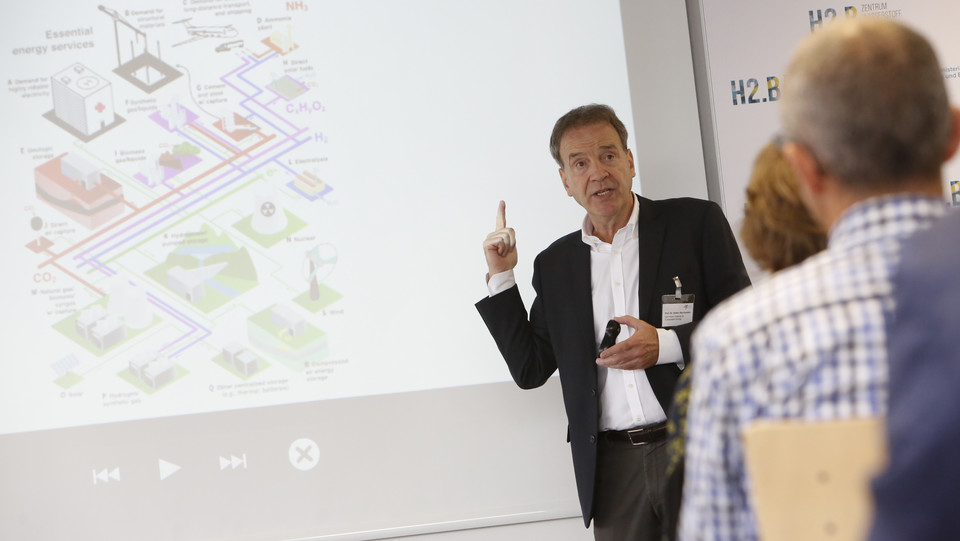Hydrogen Day 2019

Friedrich-Alexander-Universität Erlangen-Nürnberg
Conference on renewable hydrogen attracts high-profile participants from universities, industry and politics
To discuss the potential of hydrogen in a decarbonized economy, the Mannheim Institute for Sustainable Energy Studies (MISES) co-organized a conference in cooperation with the newly founded centre for Hydrogen.Bavaria (H2.B) at the Energy Campus Nuremberg (EnCN) on October 17, 2019.
In the search for alternatives to carbon-intensive fossil fuels, hydrogen has considerable potential. The gas effectively provides an energy platform for many applications, including fuel for transportation, feedstock in chemical industries, and energy storage for power generation. While hydrogen can be obtained through multiple processes, its production from renewable electricity via a power-to-gas process bears the advantage of the hydrogen being free of carbon dioxide emissions. Such electrolytic production of hydrogen has so far been regarded as too expensive, but the recent steep decline in the cost of renewable power suggests that the economics of power-to-gas facilities are about to change.
The event brought together a collection of distinguished participants from industry, policy and academia. Amongst the speakers was Hubert Aiwanger, Bavarian State Minister of Economic Affairs, Regional Development and Energy. He argued that the Bavarian government is currently developing its own hydrogen strategy. The government is eager to support alternative drivetrains, including hydrogen fuel cells, and plans to massively expand the network of hydrogen fuel stations. State Minister Aiwanger is convinced that “besides batteries, hydrogen will play a major role.”
Opening remarks for the conference were provided by Prof. Veronika Grimm, professor of economics at the University of Nuernberg-Erlangen and Prof. Stefan Reichelstein, Director of MISES. Stefan Reichelstein then presented a new research paper on the “Synergistic Value in Vertically Integrated Power-to-Gas Energy Systems”. Such systems can, as he explained in his talk, produce carbon-free hydrogen from electricity at significantly lower cost than was previously thought to be economically feasible. These lower production costs make renewable hydrogen cost competitive at prices that are currently paid for hydrogen produced from fossil fuels with substantial carbon dioxide emissions. Concluding his talk, Prof. Reichelstein noted that the findings made him appreciate the prediction that the years 2020–30 might be for hydrogen what the 1990’s were for solar and wind.
Further speakers included Chris Goodall, who is a British author and investor in the field of renewable energy. Mr. Goodall outlined parts of his upcoming book on renewable energy and hydrogen and shared his perspective on the topic with expertise from the British market environment. Prof. Dr. Tim Hosenfeldt, Senior Vice President for Innovation and Central Technology at Schaeffler AG, emphasized the importance for the German industry to progress quickly and to set international standards. Finally, Dr. Jürgen Guldner, Vice President for Hydrogen and Fuel Cell Technology at BMW showcased a new hydrogen-powered 5-Series Gran Tourismo.
Dr. Gunther Glenk, Assistant Professor at MISES, presented his work on the “Economics of Reversible Fuel Cells”. Such technology can frequently switch between the generation of electricity from hydrogen and the generation of hydrogen from electricity. While power generation from hydrogen has been regarded as too expensive, Dr. Glenk showed that reversible fuel cells could provide electricity at competitive prices by largely operating into the direction of hydrogen production and only occasionally switching to electricity generation when needed. Reversible facilities could then, for instance, generate power during periods when the intermittent generation at wind and solar installations fall short to cover demand.
MISES examines the challenges and innovation opportunities that emerge from the transition to a decarbonized energy future. The portfolio of projects covers the power, transportation and industrial sectors. To facilitate the ongoing dialogue on these topics with external researchers and policymakers, the MIESES team led by Prof. Stefan Reichelstein frequently reaches out to industrial partners and affiliates through publications and events.
The Energy Campus Nuernberg is a research center developing new technologies for the entire energy system. As an independent research network, it collaborates with six research institutions from the metropolitan region of Nuremberg as an interdisciplinary think tank. Together with industry, the Energy Campus works in projects to develop solutions for the energy needs of tomorrow.
